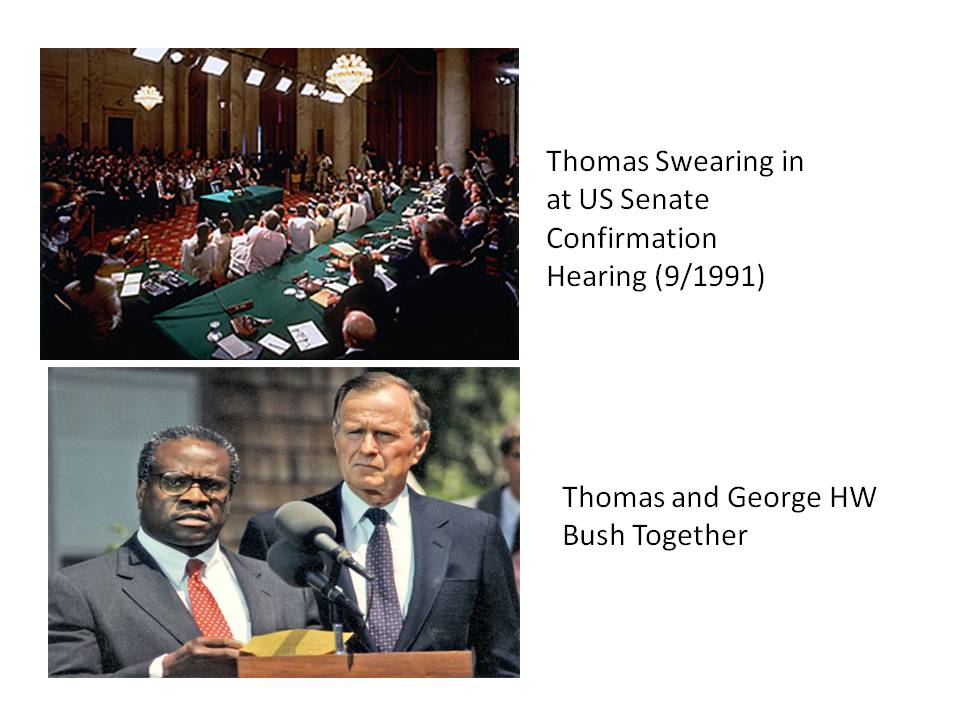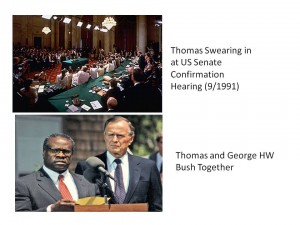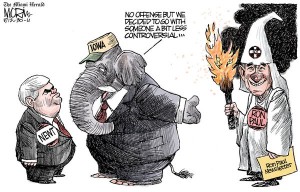By Jim Hoover
Our system of leadership grossly failed us regarding the appointment of Clarence Thomas to the Supreme Court.
Apart from his questionable associations with outside forces, apart from lying about his wife’s income for several years, apart from refusing to recuse himself for decisions that involved a definitive conflict of interest, and apart from taking gifts from vested interests, he is not and was not mentally qualified for a position requiring high ethics and impartiality in the first place.
I have had more respect for George H.W. Bush, especially after comparing him to his profligate son, George W, but he let himself be herded into a cynical political game by the rising neo-conservative movement. With their urging, he cynically looked for a black appointee, regardless of his qualifications, to the Supreme Court, one who would prove to be inflexibly right-wing.
Democrats played the same cynical political game, being more concerned about not losing political face, thus harming their chances for re-election. As a result their handling of the Anita Hill sex abuse charges and their research on Clarence Thomas failed miserably.
Clarence Thomas is a bitter man, as evidenced by his autobiographical snipes at real and imagined enemies, mostly liberals, in his 2007 book, My Grandfather’s Son.
Even worse, his thinking and his rulings prove him a regressively-dogmatic thinker.
One would expect the questioning by Republicans and Democrats to shake out some of his bitter thoughts and radical beliefs — blemishes that threaten the high standards of Supreme Court Judges. None of the following Dickens-era beliefs, at a time when the vulnerable were chattels, were revealed:
- He has declared that the Constitution gives states a right to establish an official religion.
- Prisoners, he wrote, have no Constitutional right to be protected from beatings by guards.
- Teenagers and students have no free-speech rights at all because in the 18th century, when the Constitution was written, parents had “absolute authority” over their children.
On a number of rulings he has been the only dissenter, even more radically fundamental and draconian than his four conservative compatriots:
- Two years ago, Thomas was a lone dissenter, believing that a 13-year-old girl could be strip-searched to look for 2 extra-strength ibuprofen pills, calling the search of her underwear “reasonable and justified.”
- Alone, he voted to strike down a key part of the Voting Rights Act that gave blacks political power in the South.
- He was the lone justice to uphold the George W. Bush administration’s view that an American citizen could be held as an “enemy combatant” with no charges and no hearing.
Many conservative appointees to the Supreme Court have become bastions of proper jurisprudence as their tenure grew.
Even before his appointment, it was evident that Clarence Thomas is a Victorian anachronism, ill fit to be an impartial judge on any court.
The deprivations of his formative years seemed to cause a malignancy to grow. Accordingly, a spiteful nature seems to have emerged, which puts power and plutocratic recognition above fairness and justice for American citizens.
A Blighted and Cynical Process Chose Clarence Thomas,





Casey
7 Jul 2011I think Clarence Thomas is way too much of a secessionist for my taste. He doesn’t realize that the union is a common government for all people in the many states and not a collection of individual sovereign states.
PS: my interpretation of the union is backed up by George Washington, Andrew Jackson, Thomas Jefferson, etc. Clarence Thomas might be able to point to the writings of John C. Calhoun to defend his interpretation but that is about it.
Morgan
7 Jul 2011Casey, I think your right about his John C. Calhoun political philosophy. I think Daniel Webster had it right when he said the constitution is a contract between people and the federal government, not states and the federal government.